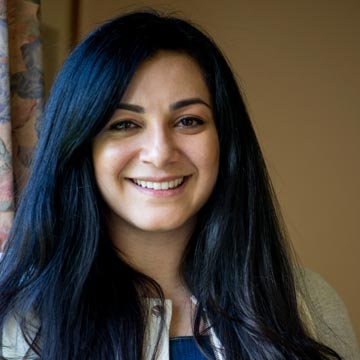Roujin Mozaffarimehr '08
Immigration Attorney, Goeschl Law Corp.

To cover or not to cover? That was the question Roujin Mozaffarimehr ‘08 posed during her senior year at Santa Clara University in a series of presentations on the meaning of headscarves in Islam and the relationship of the practice of head covering to human rights.
A Hackworth Fellow at the Markkula Center for Applied Ethics, Mozaffarimehr was charged with encouraging ethical reflection among her classmates. Her thoughtful examination of the headscarf issue started a conversation on campus that she later took to the Center’s website.
In that essay, she talked about her own experiences as someone who grew up in a family that no longer actively practiced Islam but still respected the culture and traditions. She remembers, “Having had the opportunity to go back a couple of times to Iran, it could be difficult. I was used to wearing what I wanted, but when I went there, I had to wear a headscarf.” She especially remembers being hassled by a woman at a mosque for a strand of hair that had escaped her head covering. On the other hand, she questioned barring headscarves altogether, as France does in public spaces.
“What was imparted to me through working at the Ethics Center,” she says, “was the desire not to limit people, to allow them to live the way they want.” Mozaffarimehr sees that value play out in her current work as an immigration attorney.
From the time she was a student in SCU’s JD/MBA program, Mozaffarimehr has been involved in immigration law. Initially, she worked in a family-based practice, helping clients with problems such as asylum defense, deportation defense, and temporary protective status for people from countries in a state of war.
Eventually, she decided to join the business immigration practice at Goeschl Law Corp., which allows her to draw on both her law and business backgrounds. She works with companies that want to hire employees who need work visas and then assists the employees in becoming permanent residents and citizens if they so choose.
She particularly likes working with a classification called “aliens of extraordinary ability.” This category allows priority visas for immigrants who possess extraordinary ability in the sciences, arts, education, business, or athletics. “I get to meet brilliant people,” she says. “My job is to create an application—really a story—presenting the Immigration Service with their achievements and contributions.”
Sometimes immigration law is hard work emotionally. “It’s very difficult to get a visa to work in the United States,” Mozaffarimehr says. “Everything is so backlogged, it can take years and years before my clients can be here as permanent residents. It’s hard to watch people do the waiting game.”
But to Mozaffarimehr, the rewards outweigh the difficulties. “Immigrants are looking for a better life for themselves and their children,” she explains. “You see a person, their spouse, their children have opportunities here that they didn’t have back in their own country.”
